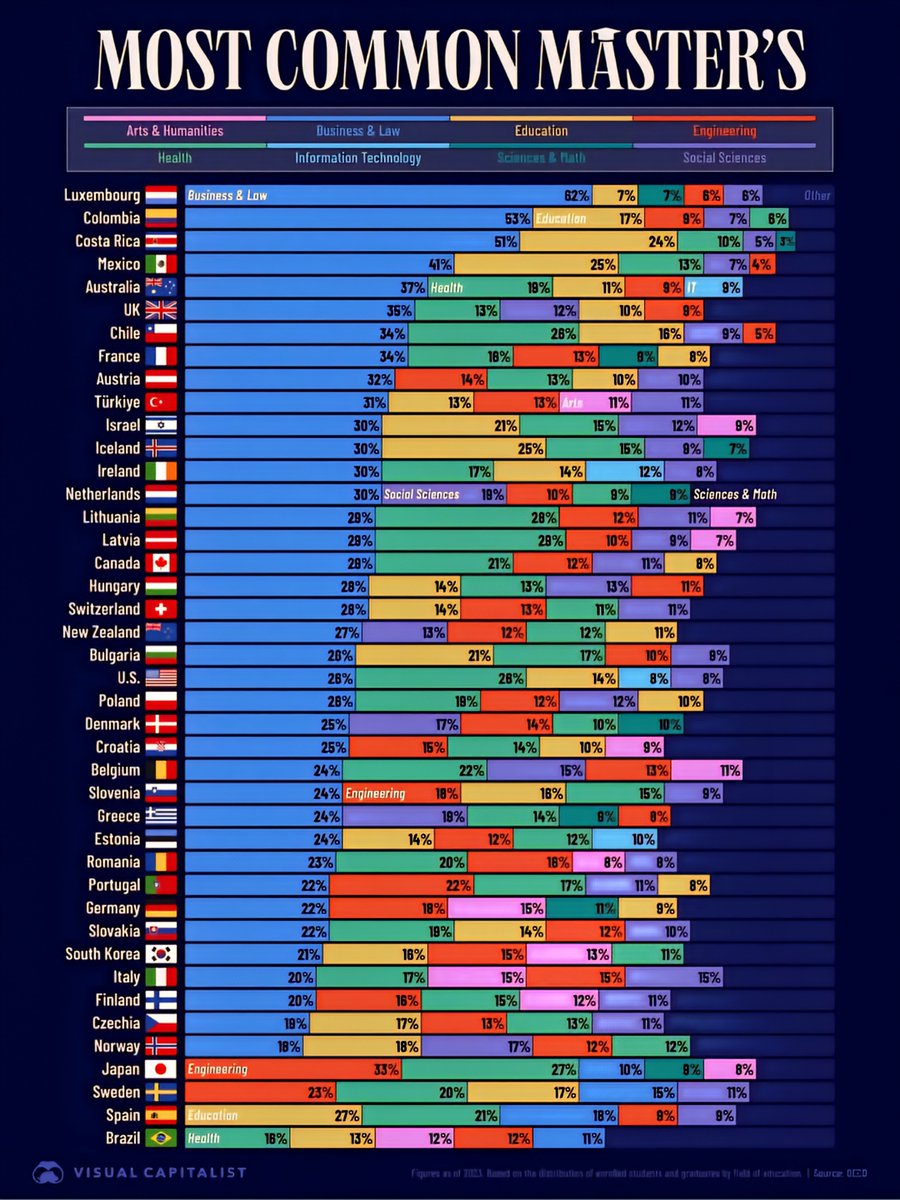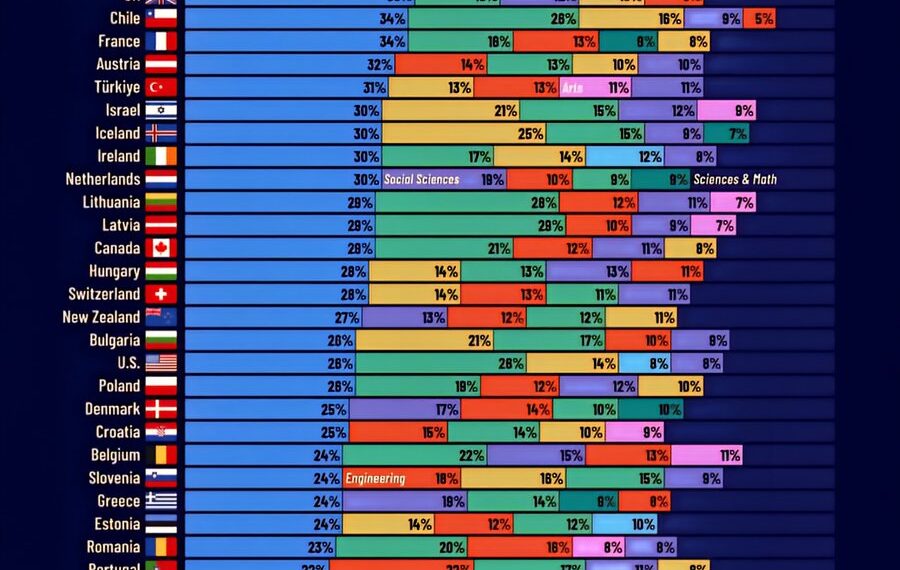Select Language:
Most Common Master’s Degrees by Country in 2025

1. The United States: Business Administration and Management
In 2025, the United States continues to see a robust demand for Master’s degrees in Business Administration (MBA). This program remains the top choice for students aiming to land leadership roles across corporate America. With an emphasis on entrepreneurship, financial strategy, and leadership skills, the MBA prepares graduates to thrive in a competitive job market. Universities like Harvard, Stanford, and Wharton remain popular destinations for aspiring business leaders.
Beyond traditional MBA programs, specialized master’s degrees such as Master of Finance and Master of Marketing are also gaining popularity, reflecting the evolving landscape of business and technology. The rise of online programs has made obtaining these degrees more accessible to working professionals across the country.
2. Canada: Environmental Science and Sustainability
Environmental concerns and climate change have driven Canadian students towards advanced studies in Environmental Science and Sustainability. As Canada continues to invest heavily in green technologies and policies, mastering knowledge in sustainable development, conservation, and renewable energy has become crucial. Universities like the University of Toronto and the University of British Columbia are renowned for their cutting-edge research and comprehensive degree programs in these fields.
These graduate programs foster skills necessary to address pressing environmental issues while also preparing students for careers with governmental agencies, non-profits, and private sector companies committed to sustainable practices.
3. United Kingdom: Data Science and Big Data Analytics
Despite Brexit and other political challenges, the UK remains at the forefront of technological innovation, especially in data science. Master’s degrees in Data Science and Big Data Analytics are among the most sought-after programs. London-based universities like Imperial College London and University College London offer rigorous curricula that combine statistics, computer science, and business analytics.
The surge in digital data across industries like finance, healthcare, and e-commerce underscores the importance of these advanced degrees. Graduates are equipped with skills in machine learning, predictive modeling, and data management, which are highly valued by employers globally.
4. Australia: Healthcare Administration
With an aging population and the ongoing needs of the healthcare sector, Australia increasingly values professionals with specialized training in Healthcare Administration. Master’s programs in this field prepare students for leadership roles within hospitals, clinics, and health policies.
Universities such as the University of Melbourne and the University of Sydney offer comprehensive curricula focusing on healthcare policy, finance, and management. These programs are tailored to meet the demands of an evolving healthcare landscape, especially as technology integration and telehealth services expand.
5. Germany: Mechanical Engineering
Germany’s reputation for engineering excellence persists into 2025, with Mechanical Engineering remaining the most common Masters degree among technical students. The country’s focus on automotive innovations, renewable energy, and manufacturing sustains high student interest in advanced engineering studies.
Top universities like Technische Universität München and RWTH Aachen offer research-intensive programs with collaborations stemming from industry giants such as Volkswagen and Siemens. Graduates often find positions in automotive design, robotics, and energy systems, fueling Germany’s industrial strength.
6. India: Computer Science and Artificial Intelligence
As India accelerates its digital transformation, master’s programs in Computer Science and Artificial Intelligence (AI) are highly popular. Institutions such as the Indian Institutes of Technology (IITs) and Indian Institute of Science (IISc) provide specialized AI tracks that attract students eager to innovate in software development, machine learning, and automation.
The country’s thriving tech startup ecosystem fuels demand for skilled AI engineers and researchers. These degrees often include internships and industry partnerships to prepare students for immediate entry into high-growth fields.
7. France: International Relations and Diplomacy
France’s strategic geopolitical position and active role within the European Union prompt a continued interest in Master’s degrees in International Relations and Diplomacy. Leading institutions like Sciences Po and Paris School of International Affairs offer programs emphasizing global politics, negotiation strategies, and economic policies.
Graduates often find careers in government agencies, international organizations, or NGOs working on diplomatic initiatives, peacekeeping efforts, and economic development.
8. Japan: Robotics and Automation
Japan’s leadership in robotics manufacturing keeps Master’s programs in Robotics and Automation extremely popular among students. University of Tokyo and Kyoto University offer advanced research opportunities in this rapidly advancing field, combining engineering, computer science, and artificial intelligence.
Graduates are equipped to work on cutting-edge developments in industrial automation, consumer robots, and smart systems, positioning Japan as a leader in technological innovation.
9. China: Education Management
As China expands its focus on reforming its education sector, Master’s degrees in Education Management have seen a rise in interest. Universities such as Tsinghua University and Beijing Normal University provide programs aimed at improving educational policies, administration, and curriculum development.
Graduates often work within local and national school systems, pioneering new teaching methods, and managing large educational institutions.
10. Brazil: Public Health
With ongoing health challenges and focus on community health, Brazil’s most common Master’s degree is in Public Health. Universities like Universidade de São Paulo (USP) offer comprehensive programs involving epidemiology, health policy, and disease control.
Graduates are vital in designing health programs, managing disease outbreaks, and implementing public health initiatives across diverse, often underserved populations in Brazil and beyond.
In Summary: The landscape of Master’s degrees in 2025 reflects global priorities—from climate action and sustainable development to technological innovation and healthcare—highlighting the importance of specialized knowledge in shaping future careers worldwide.







